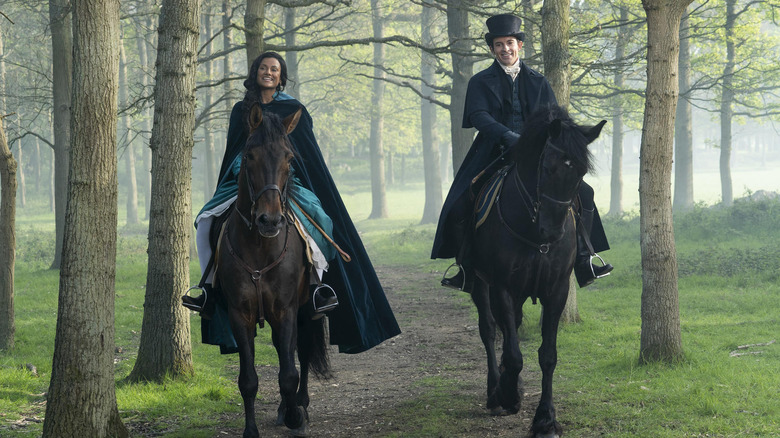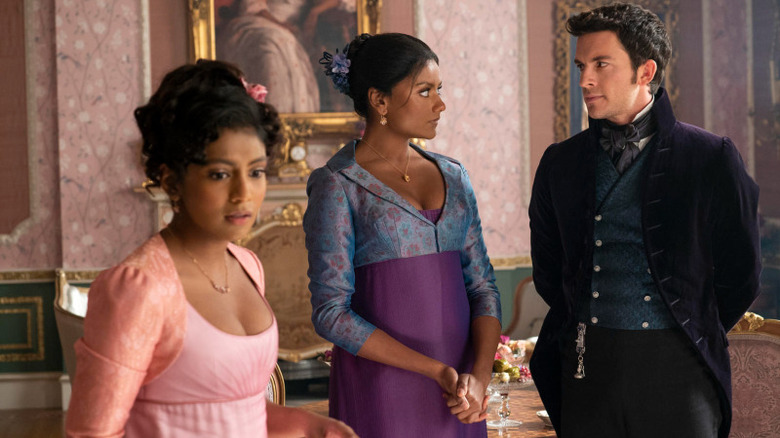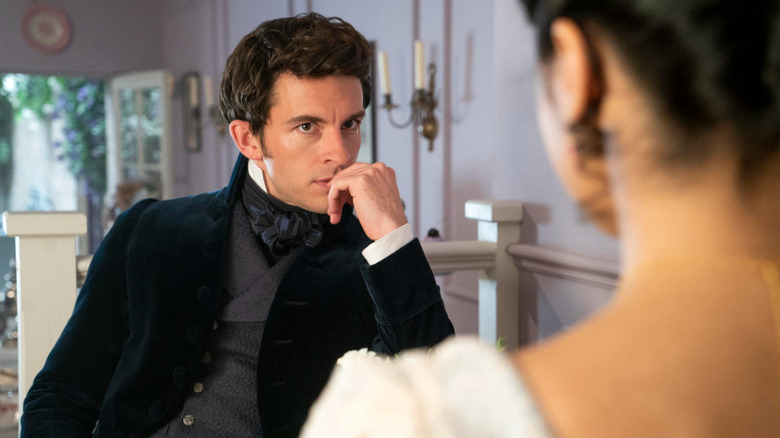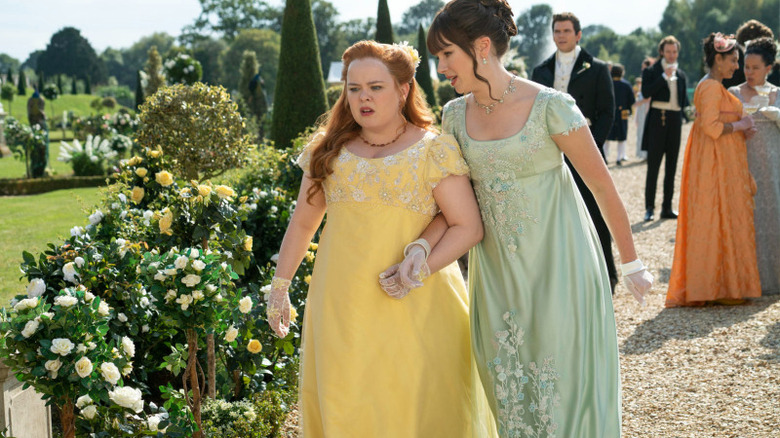Bridgerton Season 2 Ending Explained: An Ending With The Promise Of A New Beginning
Warning: major spoilers ahead for "Bridgerton" season 2.
Netflix's "Bridgerton," based on Julia Quinn's Regency-era romance series, opened a Jane Austen-esque portal when the show first aired in 2020. The raw appeal of the series understandably resided in the portrayal of flawed characters struggling to fit in with the society of the time, and the show's central romance between Simon (Rege-Jean Page) and Daphne (Phoebe Dynevor) was something truly special to behold.
The showrunners behind "Bridgerton" managed to sculpt a period drama that raised pertinent questions about the ways in which women were solely expected to adhere to patriarchal gender roles, their sole purpose in life to find a suitable match, and the stark contrast in treatment that the men in the period underwent. Be it Anthony Bridgeton's (Jonathan Bailey) blatantly rakish ways or the freedom inherent within Benedict's choice to pursue the arts, the men in "Bridgerton" have always been able to navigate their innermost desires without repercussion, while every woman who entered society in the 'ton was subject to intense scrutiny. "Bridgerton" season 2 delves deeper into these issues, but with mixed results (check out the latest season's review by /Film's Shania Russell), succeeding in some areas, while others remain underdeveloped at best.
The ending of "Bridgerton" season 2 obviously sets up the next chapter of events that take place in Quinn's series of novels, wherein each volume is dedicated to the arc of every offspring in the Bridgerton household (all named in alphabetical order, from A to H!). Season 2 is clearly Anthony's story. In season 1, we saw him gatekeeping Daphne's marital prospects for the most part while struggling to navigate the societal expectations that come with his family name while having a romance with opera singer Sienna Russo. Anthony wishes to get the new marriage season over with, choosing to remove love from the equation as he prioritizes his duties as head of the household. However, fate has other plans: enter the witty, graceful, blunt Kate Sharma (Simone Ashley). And oh boy, is it difficult for Anthony to keep up with her, or even his own repressed emotions for that matter.
An extremely flustered Viscount in a love triangle (of sorts)
In episode 6, "The Choice," Anthony is set to marry Miss Edwina Sharma (Charithra Chandran), Kate's sister, who he aggressively courts throughout the marriage season, much to Kate's dismay. However, the reasons behind Kate's disapproval are layered: she overhears the Viscount say to his mates that he is not interested in a love match, but rather a rigid, practical approach in zeroing in on the "perfect" Viscountess for his family; someone who is capable of performing her duties well. This is disheartening for Kate, as she wishes the best for her sister, and her seeming disdain for Anthony has been reciprocated since they first met. Underneath this veneer of mutual dislike, however, is a tornado of emotions that both parties are too proud to admit, lest they fail to play out their respective roles within their families.
The Queen names Edwina the diamond of the season (a rather terrible weight to carry, given how the 'ton has their hawk-like eyes watching the diamond's every move), hence she is present at the wedding to give her blessings. Anthony is set on carrying out what he envisioned to be best for his family, but love cannot be merely stowed into a corner. It will manifest when you least expect it, and it does. A rather seminal moment in which Kate unconsciously drops her bangles during the ceremony, and the simple act of Anthony picking it up for her, betrays his true emotions: Edwina instantly recognizes the glances exchanged between them (too entrenched in longing, months of pining, and repressed horniness). The marriage is called off by Edwina herself, tense confrontations are exchanged, and both Kate and Anthony have to bear the brunt of shame, confusion, and rage due to the events that occur. Edwina shines best at this moment — she is clearly hurt, betrayed by her sister's actions — making the choice to not marry the man who doesn't love her.
This (finally) allows Kate and Anthony the space to express themselves, and the two are able to shed their pretenses (and their clothes) and accept the simple fact that they "burn" for each other. Season 2 lacks the sexy unabashedness of season 1, especially in the way in which Simon and Daphne's dynamic was so charged throughout, but there are several moments between Kate and the Viscount that brim with unbridled desire. Nonetheless, towards the end, Kate, after suffering an accident and deciding to leave for India, goes to one last ball for the season, and this is when the magic happens. A dance with Anthony puts their mutual love for each other on a platform for everybody to see, and the "enemies to lovers" trope finally comes to fruition in a way that is satisfactory (the slow burn, the glances, the unbearable pining can sometimes be a tad too much for viewers). All is well in the end, and the two marry, finally able to be their authentic selves without being (completely) tied to expected gender roles and societal obligations.
The heavy burden of societal roles
Season 2 juggles with a wide array of storylines, focusing on many (perhaps too many) narrative threads that aim to further the arcs of the other characters. Violet Bridgerton, the matriarch of the family, had much more to do this season apart from being a doting mother: several flashbacks portray the heart-wrenching death of her husband (an accidental bee sting), and how she is expected to give up her bodily autonomy while in labor right after. The trauma of the event is visibly felt the most by Anthony, only a young adult at the time, who is thrust into the role of the male head of the house with no preparation, expected to make a decision about her mother's life during childbirth, which poses the threat of losing either her or the child inside her.
However, in a particularly powerful scene, Violet (who is distressed by the recent passing of her husband), tells Anthony that he has no right to make that choice — it is her body, and the decision is solely hers to make. While Anthony respects her decision after much thought, this highlights a seminal problem with how women are perceived in terms of their minds and bodies, and the extremely harmful patriarchal expectations that come with being a male provider in a family. It is this problematic notion of maintaining gender-expected duties and societal status that spurs Anthony's actions throughout the season, as he is unable to heal his generational trauma in a healthy way, giving in to the trappings of a marriage of convenience. It is Daphne who reminds him that love is the most important factor in the equation, as denying one's true feelings for the sake of societal norms would only birth a life of regret and unhappiness for both him and Edwina.
Another family matriarch, Mrs. Featherington, cannot stop scheming (as she must, given her husband's death and almost bankruptcy) while she waits for the new "Lord Featherington," (Rupert Young) a distant cousin who is expected to resolve family debts. However, he turns out to be a liar and schemer, and Lady Featherington goes along with his schemes for her own ends, which is to chiefly make sure that her daughters have enough dowry for a suitable match. In the end (after a weird, yet hilarious romantic back-and-forth with the new Featherington), she chooses to be a good mother, fulfilling the role to the point of threatening exposure of Featherington's lies, who she has happily schemed with for quite some time. I guess she did what she deemed best for ensuring her family's future, and as Featherington was no gentleman, it does serve him right.
Those who walk the unbeaten path
Despite their own way of standing up for themselves and making tough choices, the central characters still fit into societal molds of expected behavior. However, this is not the case with Eloise (Claudia Jessie) and Penelope (Nicola Coughlan), two women who express their desires in markedly different ways. While Eloise's blunt, uncomfortable demeanor during her entrance into society is a clear indicator that this is not the life she wants, Penelope's secret life as Lady Whistledown compels a game of lies and secrets, one she begrudgingly has to participate in. In the search for unmasking the true identity of Whistledown, Eloise is exposed to the women's suffragettes movement, and a possible romantic entanglement with Theo Sharpe, who works at the printing press Whistledown uses. This creates tension between Eloise and Penelope's friendship (although the former is unaware of this until the end), and the latter is forced to take drastic measures to conceal her identity. It does not end well for them (for now).
Penelope, or Whistledown, chooses to publicly expose Eloise's feminist ideologies (an unthinkable scandal at the time) in order to protect her, but this backfires in the ugliest of ways once Eloise discovers the truth. This is heartbreaking, as an essential foundation of trust is shattered between the two, and their friendship was one of the most endearing parts of "Bridgerton." Eloise feels understandably betrayed, and Penelope, while trying her best, is caught too deep in her own double life, eventually deciding to retire from her scathing public persona. To see women go to extreme ends just to make their voices heard, to struggle to create a safe space for self-expression and the exercising of basic human rights for themselves is still a movement in progress, with much left to do. To see Eloise and Penelope trying to muster enough courage to make a difference in their own way is uplifting, but the consequences from a societal point of view are dire: shame, scandal, ostracization, and constant threats from those in power.
On the other hand, there's Colin (Luke Newton) and Benedict (Luke Thompson), going about their own lives, attempting to carve their own paths. Benedict struggles with self-confidence in his artistic pursuits, but gradually embraces his gifts, irrespective of the circumstances. However, Benedict's obstacles are self-inflicted, as society does not bat an eye as to what he does for now, which will most probably change now that Anthony is married and he is next in line. Can Benedict still be a pleasure-seeker, a dandy-esque figure, an artist while giving into societal expectations? He certainly can, but whether he chooses to remains to be seen. Then there's Colin, who still pines for Marina, oblivious to Penelope's presence, although he values her as a friend. "I am a woman," points out Penelope when Colin says he has vowed off all women, to which he says, "No, you're Pen. My friend, Pen." This hurts Penelope, especially in the end, when she overhears Colin laugh at the prospect of courting her, which, in honesty, was a tad unnecessary and comes off as cruel, which Colin is the very opposite of.
In essence, "Bridgerton" season 2 ends with a gift-wrapped happy ending, a separation in friendship, and the promise of a new beginning which also harkens to the arrival of fresh challenges. If the showrunners follow Quinn's novel series format, Benedict will be the center of the next season, although the character has sadly been underdeveloped outside of his artistic endeavors. Penelope and Eloise emerge with promising character arcs, with the potential of following their interests in ways never done before (within the ambit of Regency era), but it remains to be seen whether we are treated to yet another volatile, excruciatingly-horny love story, which formed the basis of the first two seasons.
Season 2 of "Bridgerton" premiered on Netflix on March 25, 2022.



